With funding from the William and Flora Hewlett Foundation, the Impact Evaluation (IE) Lab was co-founded in September 2019 by the Economic Social Research Foundation (ESRF), under the leadership of ESRF’s Executive Director, Dr. Tausi Kida; ESRF’s Director of Governance and Capacity Building, Mr. Danford Sango; and the IE Lab’s Director, Mr. Constantine Manda, and launched by Ms. Mary Maganga, the Deputy Permanent Secretary -Treasury Services with the Ministry of Finance and Planning. To learn more about the People of the IE Lab see our People page by clicking here.
Vision, Mission and Value
The IE Lab’s Vision is to become the premier center for policy-relevant impact evaluation research. Our Mission is to expand the impact evaluation space in Tanzania through capacity-building of local researchers in IE methods; facilitating interactions between IE researchers, both local and international, and policy-makers; producing cutting-edge rigorous impact evaluated-knowledge of interventions and policies; to ultimately inform better policies that improve the lives of Tanzanians. Given our nation’s limited resources and low average incomes, it is important to change mindsets of everyone, and not just academics, technical researchers in both government and non-governmental spaces. This is why our core Value is that every Tanzanian should be exposed to IE, even at its simplest idea, and this is why we value the need to have every Tanzanian with an interest to be invited into the IE space, regardless of education, ethnicity, political persuasions, gender, or religion.
Objectives
The Objectives of the IE Lab include the following:
- To empower Tanzanians to discern what works or does not work in development through training in IE methods;
- To deepen technical knowledge of IE methods for a subset of Tanzanians whose interest, prowess and commitment is substantive so that they may be independent IE researchers;
- To facilitate interactions between IE researchers in Tanzania and beyond so that fruitful and equal partnerships between the two groups in ways that generate new insights on what works in development;
- To facilitate interactions between IE researchers, both local and international, and policy-makers including government bureaucrats and elected public officials whose influence matters for Tanzania’s development so that no or very few interventions may be imagined, designed, and implemented without IE.
People
The Impact Evaluation Lab is staffed by the following individuals.
Dr. Constantine Manda is the IE Lab’s Director but also an IE researcher and trainer in Tanzania and across the continent with more than ten (10) years of experience. Dr. Manda has been involved in both experimental and quasi-experimental work in Tanzania including large, multi-million dollar randomized experimentally-evaluated in Tanzania in collaboration with the Innovations for Poverty Action, the government of Tanzania, and researchers from the University of California, San Diego, and the University of Virginia which was published in August 2019 at the Quarterly Journal of Economics.
Constantine has instructed on impact evaluation at the University of Dar es Salaam’s Economics Department, the African School of Economics, and at the ESRF as pre-cursor training sessions to the IE Lab. Constantine has also guest-lectured on development economics at Nairobi’s Strathmore Business School and on African politics at Yale University.
Constantine is also a co-founder of the Network for Impact Evaluation Researchers in Africa (NIERA) which was founded by former Center for Effective Global Action (CEGA) EASST Fellows, to which Constantine was among the first cohort of Fellows in the Fall of 2012 at the Economics Department of the University of California, Berkeley advised by Oxfam Professor in Environmental and Resource Economics and CEGA Faculty Director, Edward Miguel.
Because of his work in expanding the IE space, Constantine was nominated, by-then Director General, Dr. Hassan Mshinda, to sit, during 2015-2018, in the Research and Development Advisory Committee on Basic Science at Tanzania’s Commission for Science and Technology (COSTECH). Constantine is also a member (2018 – 2019) of the Advisory Group on Impact Evaluation at the Africa Centre for Evidence at the University of Johannesburg.
Constantine holds a doctoral degree in comparative politics and the political economy of development with a focus on Africa.from Department of Political Science at Yale University.
Constantine’s work has been funded by the Hewlett Foundation, Yale University’s MacMillan Center for International and Area Studies, and the Center for Effective Global Action at the University of California, Berkeley, and is a multiple contributor on the Washington Post’s Monkey Cage Blog. Constantine has consulted with REPOA, Tanzania’s Financial Sector Deepening Trust (FSDT), and the World Bank.
Constantine has MPhil and MA degrees in Political Science from Yale University, a Master of Public Policy degree from the University of Chicago and a Bachelor’s degree in Economics from Xavier University. For more please visit his personal website here and from his CV which can be accessed here.
Mr. Danford Sango is the Head of Governance and Capacity Development Department at ESRF. He is also the programme manager for Impact Evaluation Laboratory which he co founded together with Dr. Constantine Manda and Dr. Tausi Mbaga Kida. The lab is hosted within the Department of Governance and Capacity Development at ESRF. Mr. Sango holds a Master’s Degree in Agricultural Economics (2003) from Sokoine University of Agriculture in Tanzania and Postgraduate Diploma in Poverty Analysis for Social Economic Security and Development (2007) jointly offered by Erasmus University, Rotterdam, the Netherlands, Economic and Social Research Foundation and Policy Research for Development (REPOA). Mr. Sango boasts a progressive career of over 18 years all in premier policy research think tanks in Tanzania namely ESRF and REPOA. Mr. Sango’s major areas of research interest is on policy analysis for economic growth for poverty reduction including human development analysis.
In addition, Mr. Sango has extensive knowledge and experience on program management and coordination of research, policy analysis and capacity development programs.
Mr. Zakayo Zakaria is the researcher in the IE Lab’s with background in Data, Economics and Development Policy. He holds a Bachelor degree in Economics from the University of Dar es Salaam and a Masters of Arts in Monitoring and Evaluation from the Open University of Tanzania. He is also pursuing a Micromasters Program in Data, Economics and Development Policy from Massachusetts Institute of Technology (MIT) – USA.
Mr. Zakaria has an extensive skill on quantitative studies from the designing phase, data analysis and report writing. He has attended several training sessions on data visualization and analysis using STATA and Impact Evaluation courses. Mr. Zakaria has participated in the Impact Evaluation study with Dr. Constantine Manda (former CEGA-EASST fellow) and other senior researchers from ESRF to Evaluate the Impact of the Zanzibar Universal Pension Scheme. The study was commissioned to ESRF by HelpAge International. The study used a quasi-experimental design – Regression Discontinuity Design (RDD) to evaluate the impact. The report for this study can be accessed here (https://www.helpage.org/download/5df8d9fed33e8/).
Core Researchers
Mr. Jovin Lasway
Jovin A. Lasway is currently a PHD candidate at the Department of Economics, University of Minnesota in the USA. He was previously a research fellow at the department of strategic research and publications; and impact evaluation lab, Economic and Social Research Foundation. He researches on various aspects of development and experimental economics with special focus on agriculture and natural resource economics. His research work has been published in African Journal of Agriculture and Resource Economics and African Journal of Economic Review. He received his MA in Economics from the University of Dar es Salaam, Tanzania in 2018 and has actively participated in various professional trainings on impact evaluation and experimental economics. Also, he has experience in national policymaking, monitoring, and evaluation. Since 2019 he has been active in various national policy processes, including preparation of African Union AGENDA 2063: Tanzania First Ten Year Implementation Plan (2010-2019).
Publications
Lasway, J. A., Selejio, O., & Temba, G. R. (2021). Modeling multiple adoption decisions on agricultural technologies in Tanzania: a multinomial probit analysis. Tanzanian Economic Review, 10(2).
Lasway, A. J., Temba, R. G., & Ruhinduka, D. R. (2020). Determinants of Soil Conservation Technologies Among Small-Scale Farmers in Tanzania; Evidence from National Panel Survey. African Journal of Economic Review, 8(1), 89-105.
Selejio. O, and Lasway, A. J. (2019). Economic analysis of the adoption of inorganic fertilisers and improved maize seeds in Tanzania. African Journal of Agricultural and Resource Economics, 14(4), 310-330.
Ms. Christina Fille
Christina Fille is an Economist and a Lecturer at the Institute of Social Work specializing in Economics. She is also an IE researcher and trainer in Tanzania and across East Africa with about seven years of experience. Christina has been involved in both experimental and quasi-experimental work in Tanzania in collaboration with researchers from the University of California Berkeley, University of California Los Angeles, Stanford University and Heidelberg University.
Christina is also a member of the Network for Impact Evaluation Researchers in Africa (NIERA) which was founded by former Center for Effective Global Action (CEGA) EASST Fellows, to which Christina was among the EASST Fellows in the Fall of 2019 at the Agricultural and Resource Economics Department of the University of California Berkeley advised by David Levine who is a Professor in Economics at the Haas School of Business at the University of California Berkeley and a CEGA Faculty.
Christina has completed her PhD studies in Economics at the Department of Economics at the University of Dar es salaam which was a collaborative PhD programme (CPP) in Economics initiated by the African Economic Research Consortium (AERC). Christina’s work was funded by the Hewlett Foundation, Center for Effective Global Action at the University of California Berkeley, African Economic Research Consortium and the Institute of Social Work.
Christina has an MA degree in Economics from the University of Nairobi and a Bachelor’s degree in Economics from St. Augustine University of Tanzania. Please find more information on her CV.
Publications
Fille, C. T. (2013). Financial development and economic growth in Tanzania (Doctoral dissertation, University of Nairobi).
Fille, C. D. (2021). Contextualizing Impact Evaluation Pedagogy in Africa Course Syllabus by Dr. Christina Fille.
Mr. George Temba
George Raphael Temba is a researcher at the department of strategic research and publications; and impact evaluation lab, Economic and Social Research Foundation. He is also a Ph.D. candidate (Thesis title: Essays on Social Health Insurance) at the University of Dar es salaam, School of Economics. He researches various aspects of development and experimental economics with a special focus on health economics, public finance, and agricultural economics. He received his MA in Economics from the University of Dar es Salaam, Tanzania in 2018 and has actively participated in various professional training on impact evaluation and experimental economics. Also, he has experience in national policy review (Review of 2003 SME Development Policy Review, 2020), and evaluation (Harnessing the potential of SEZ for private sector development and industrial inclusion, 2020), to mention a few. Since 2019, he has been active through research and publication in different journals as well as working on different projects one of which being, the Impact of COVID-19 on the Food system and Trade.
Publications
Lasway, J. A., Selejio, O., & Temba, G. R. (2021). Modeling multiple adoption decisions on agricultural technologies in Tanzania: a multinomial probit analysis. Tanzanian Economic Review, 10(2).
Lasway, A. J., Temba, R. G., & Ruhinduka, D. R. (2020). Determinants of Soil Conservation Technologies Among Small-Scale Farmers in Tanzania; Evidence from National Panel Survey. African Journal of Economic Review, 8(1), 89-105.
Pantaleo, I., & Temba, G. (2019). Socio-Economic Determinants of Diarrhoeal Morbidity among Children in Tanzania. African Journal of Economic Review, 7(2), 147-164.
Said Rashid
Said Rashid is a research fellow at the Impact Evaluation Lab, department of governance and capacity development at Economic and Social Research Foundation’s with background in both qualitative and quantitative research. He holds a bachelor’s degree in economics and Statistics from the University of Dar es Salaam. He is now pursuing a Micro-master’s Program in Data, Economics and Development Policy from Massachusetts Institute of Technology (MIT) – USA. Also, he has been attending various professional training courses such as fundamental methods of impact evaluation, fieldwork design, machine learning and big data.
Said Rashid’s research interests are in public health. He has been working on various impact evaluation projects aimed at increasing public health awareness such as designing and evaluating interventions that incentivize people to eat healthy diets and designing and evaluating effective COVID-19 vaccination strategies.
Said Rashid has been assisting Constantine Manda, Director of Impact Evaluation Lab in teaching Introductory impact evaluation courses that covers experimental and non-experimental methods of impact evaluation at Tanzania’s Economic and Social Research Foundation (ESRF).
Also, he has been working with international NGOs such as Restless Development and BRAC in community-based interventions aimed to promote a fight against gender-based violence against children, women, and girls.
Ms. Noela Ringo
Noela Ringo is a research fellow at the impact evaluation lab, department of governance and capacity development at Economic and Social Research Foundation. She is currently finishing her Masters of Arts in Economics degree in the School of Economics at the University of Dar es Salaam. Her master’s thesis is titled “Estimating the impact of electricity connection on primary school going children education outcomes in Tanzania”, she uses a quasi-experimental method called propensity score matching. She also holds a Bachelor’s of Arts degree in Economics from Mzumbe University. She has also completed a three week comprehensive course on Impact Evaluation from Tanzania’s Economic & Social Research Foundation (ESRF) which covered impact evaluation methodologies.
Mr. Augustine Malija
Augustine Malija is the Lab’s small grant awardee. He is analyzing tweets to track the outlook of perceptions regarding the COVID-19 vaccine in Tanzania. At his core, he is a labor economist driven to improve educational and labor market outcomes through econometric and text processing research. Alongside, he holds a diverse set of experiences spanning from sustainable development to audit. He has Public Policy and Economics degrees from Hertie School of Governance and the University of Dar es Salaam. Contact email Address: augustinemalija@gmail.com
Publications
Malija A, (2021). Stance Detection toward Climate Science Tweets. Hertie School of Governance (Unpublished)
Malija A et al (2016). Insights into Youth Economic Opportunities. MasterCard Foundation.
What We Do
The Impact Evaluation Lab’s core activities may be placed in three broad areas. The first is capacity building; the second is research; and the third is policy.
Capacity Building
The IE Lab hosts four week-long training sessions in combination at least once each year. The first three sets of training sessions are conducted in Dar es Salaam and are open to any interested adult including students, researchers, policy makers, and public officials. The fourth training session conducted in Dodoma is reserved only for government researchers who sit within various ministries, including members of local government authorities, and government institutions such as the National Bureau of Statistics, for instance.
In the trio set of sessions in Dar es Salaam called Introduction to Impact Evaluation, participants are introduced to causal inference and impact evaluation methods including randomized assignment, randomized promotion, regression discontinuity, and differences-in-differences.
A month later, during a second week-long session called Introduction to Field Work Design for Impact Evaluation, participants are introduced to questionnaire design, fieldwork organization, quality assurance, transparency, power calculations, machine learning and big data in impact evaluation research.
A month after the second set in a third week-long session called Introduction to Data Analysis using STATA, participants are introduced to the STATA software; provided an overview of basic STATA commands; how to write a do-file, more complex commands, regression mechanics using STATA, and LATEX interaction with STATA.
The week-long session for government officers is conducted in Dodoma and is similar to the first week for the Dar es Salaam training sessions. Although the Dodoma week for government officials is meant to be less technical, it is often the case that because the participants from Dodoma have training in economics, statistics, quantitative methods, they often receive the same material and instruction as the Dar es Salaam participants.
Why Do Training?
We know that capacity building training that is short term seldom has positive impacts on average but we conduct them for two reasons. First, the impact of our training cannot be zero for each and every person.If it is positive for at least one participant, then we believe it is still worth doing. Second, and most importantly, we do not see our training sessions merely as devices to spread knowledge. We use them as coordinating devices to allow researchers to interact with one another and most importantly for important individuals from government institutions most importantly to know about our work and to begin collaborating with us to conduct IE studies and/or use knowledge from IE studies to inform new policies or to improve existing ones including perhaps abandoning unimpactful policies.
Research
The second core set of activities revolves around conducting IE research studies. The Lab seeks to conduct both experimental and quasi-experimental research on various interventions including most importantly government’s interventions, programs, or policies, but also interventions from non-governmental organizations (NGOs).
Any researcher can apply for funding to conduct an IE study using the Lab’s resources. The only requirement is that, at least, one Principal Investigator in the team must be Tanzanian, preferably from among the IE Lab’s research community. For anyone interested to collaborate with any member of our IE Community of Practice, as we call it, please feel free to access a contact list here. If you have an idea for an IE study please apply by clicking here where we kindly ask that you also attach a short (no more than 5 pages) proposal clearly outlining the intervention or program or policy being evaluated; the IE method proposed to be employed; the policy-relevance of the study; and the team members including their CVs.
Completed Studies
The IE Lab has only completed one IE study. The IE study, conducted with funding from Help Age International and in collaboration with the Revolutionary Government of Zanzibar (RGZ) aimed to identify the impact of the RGZ’s Zanzibar Universal Pension Schme (ZUPS). The study involved two of the IE Lab’s researchers, the IE Lab’s Director, Constantine Manda, and one of its core researchers, Mr. Zakayo Zakaria. That particular study, using original survey data, employed the regression discontinuity design (RDD) IE method to find generally positive impacts of ZUPS on beneficiaries. The IE Lab researchers along with their collaborators are presently building from this to conduct a larger quasi-experimental RDD framework to evaluate the impact of pension schemes across the whole of Africa. They intend to write up results for publication in an academic journal.
Policy
We are not in the business of simply conducting IE research simply for the sake of conducting research. This is why policy engagement is our third core set of activities. In accomplishing this we ensure that we include government in our capacity building efforts, which we then hope to inform our IE studies including possibly collaborating with government and/or its researchers to implement policy-relevant research studies. To do so, we also host two kinds of interactive activities with government.
The first is what we call our Utafiti Wetu activity, which means “Our Research” in Kiswahili. These are essentially workshops where local, and sometimes international researchers, present their IE research work to members of our research Community of Practice. In 2019, the IE Lab hosted its firstUtafiti Wetu event where Stanford Professor of Economics, Melanie Morten, and then World Bank Senior Economist and now Research Director at the Center for Effective Global Action (CEGA), Bilal Siddiqi. Prof. Morten and Dr. Siddiqi presented an IE study that used the difference-in-differences IE method to evaluate the impact of Tanzania’s Bus Rapid Transit system locally known as “Mwendo Kasi”. The next Utafiti Wetu is planned for March 2020.
The second is what we call our Na Serikaliactivity, which means “With Government” in Kiswahili. These are essentially a set of activities that include formal meetings with government, facilitating match-making workshops between IE researchers and government, but also responding specifically to government’s request for proposals to evaluate government interventions. The IE Lab, for instance, is hoping to secure a collaboration with the water ministry to help them set optimal pricing for water services across all water regulatory entities in Tanzania. This is in addition to the collaboration between the IE Lab, HelpAge International, and the Revolutionary Government of Zanzibar.
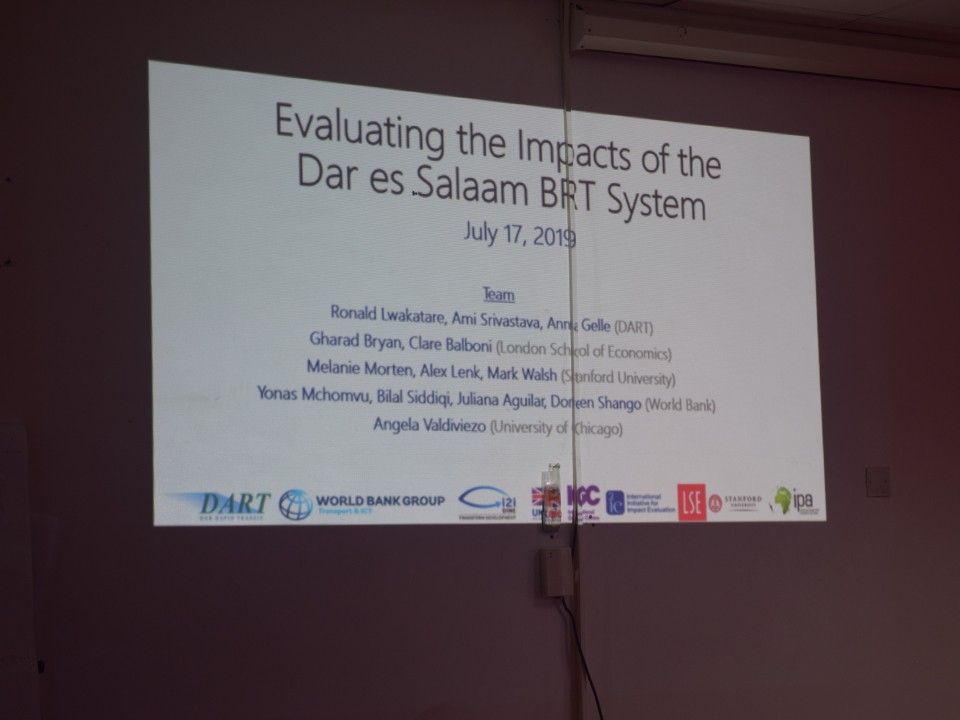
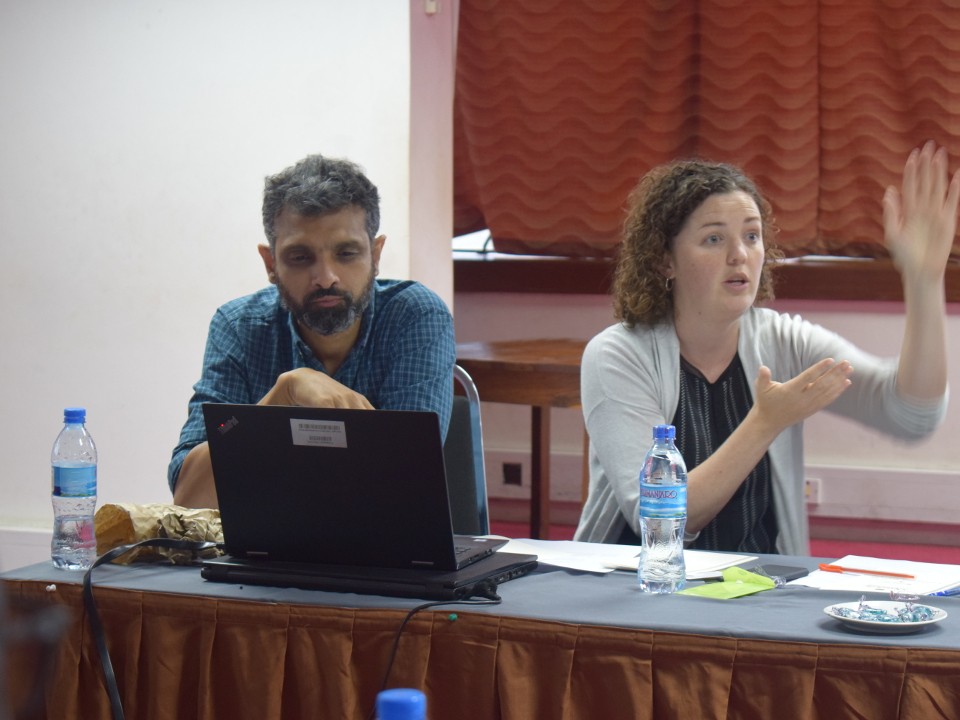
Prof. Melanie Mortem, Department of Economics, Stanford University and Dr. Bilal Murtaza Siddiqi, Economist, Development Impact Evaluation (DIME) Team at the World Bank making a presentation on Impact Evaluation of Dare es Salaam rapid transport system during a public seminar with members of Impact Evaluation Lab, 17th July 2019 in Dar es Salaam.
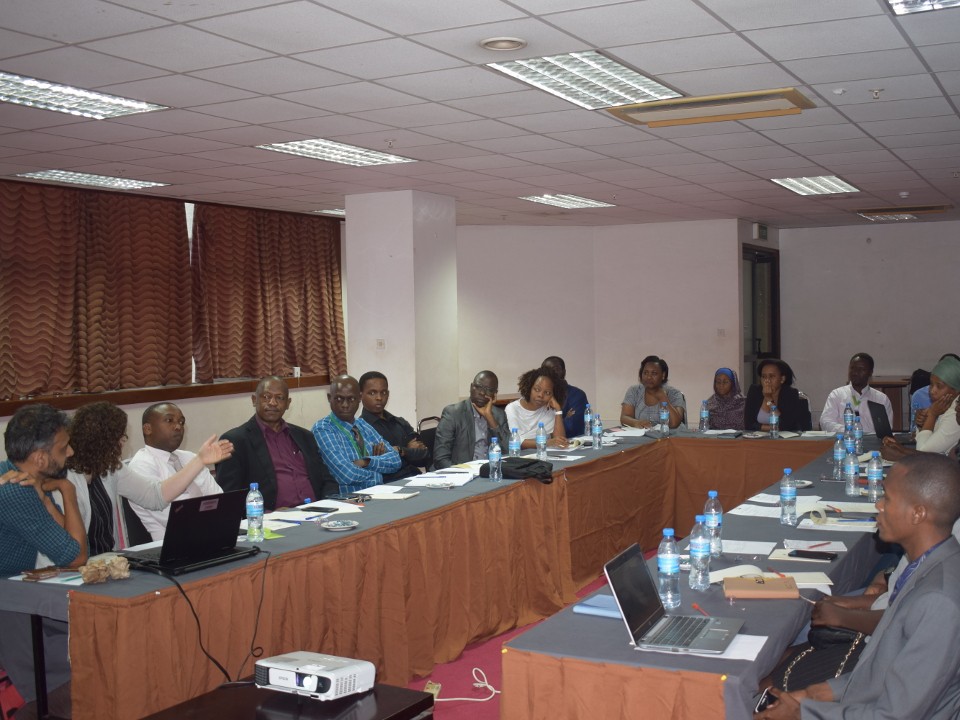
A cross section of members of Impact Evaluation Laboratory, following a presentation during public seminar on 17th July 2019
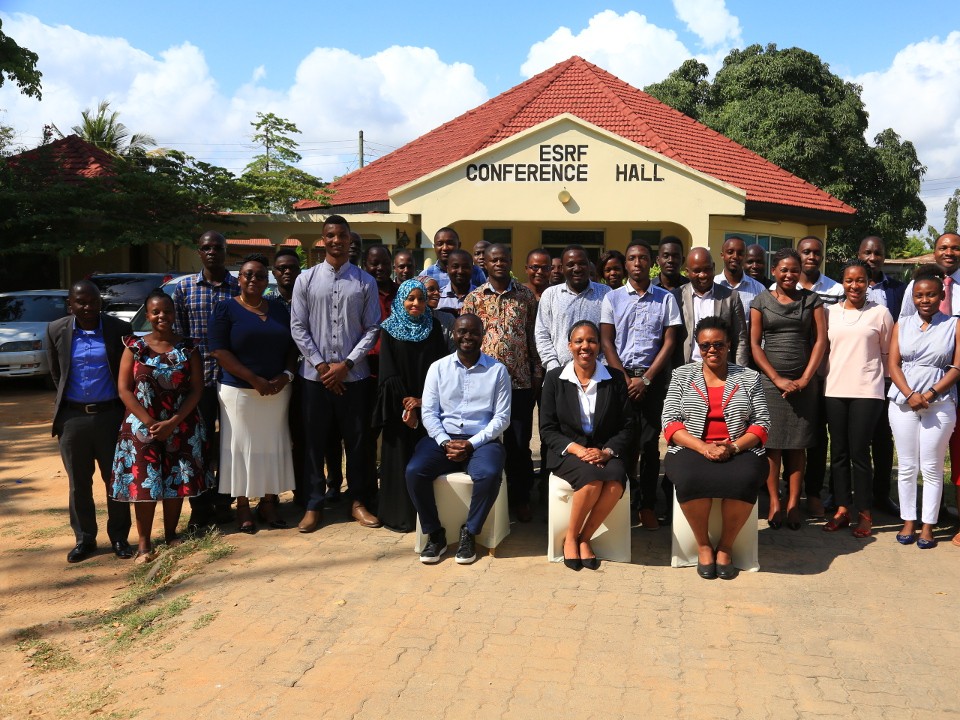
Mrs. Mary Mary Maganga, Deputy Permanent Secretary, (treasury services), Ministry of Finance and Planning in group photo with participants of training workshops on Impact Evaluation after launch of Impact Evaluation Laboratory, ESRF Conference Hall, 23rd Sept 2019
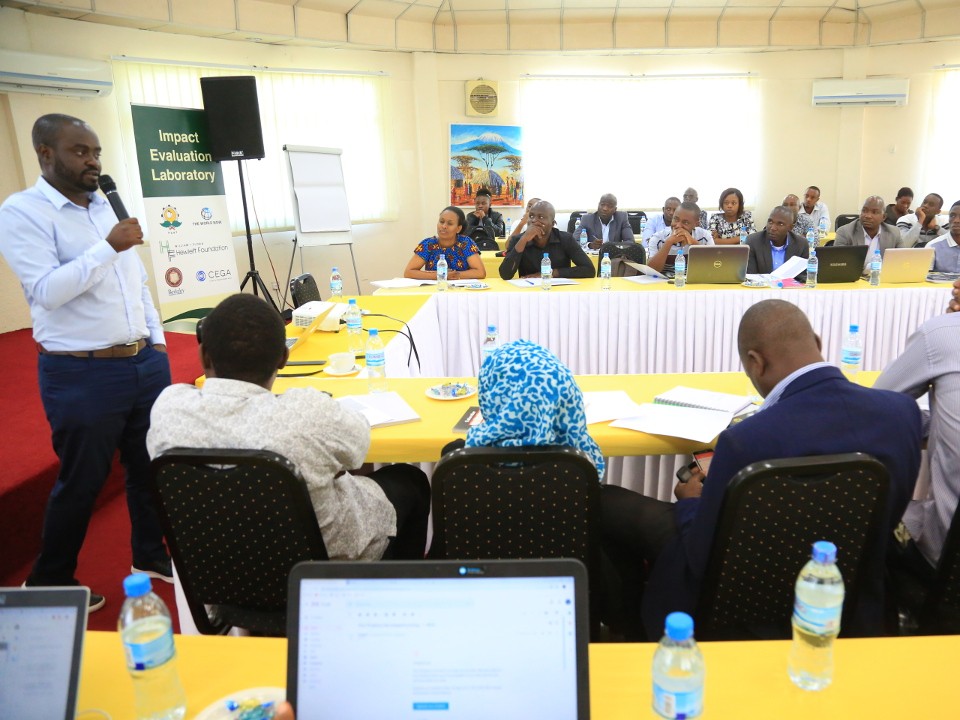
Dr. Constantine Manda, Director of Impact Evaluation Laboratory conducting training workshop on core methods of Impact Evaluation at ESRF Conference Hall, ESRF Conference Hall, September 2019
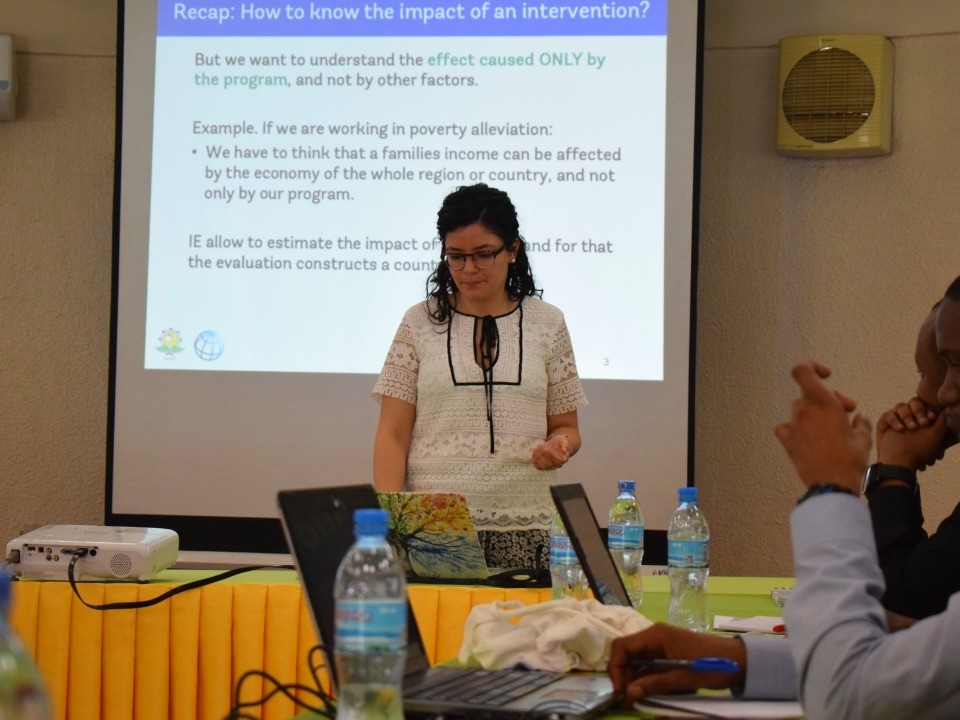
Dr. AngélicaValdiviezo, lecturer at the University of Chicago facilitating a training session on methods of impact evaluation during a training workshop on impact evaluation, public transport and urban poverty.
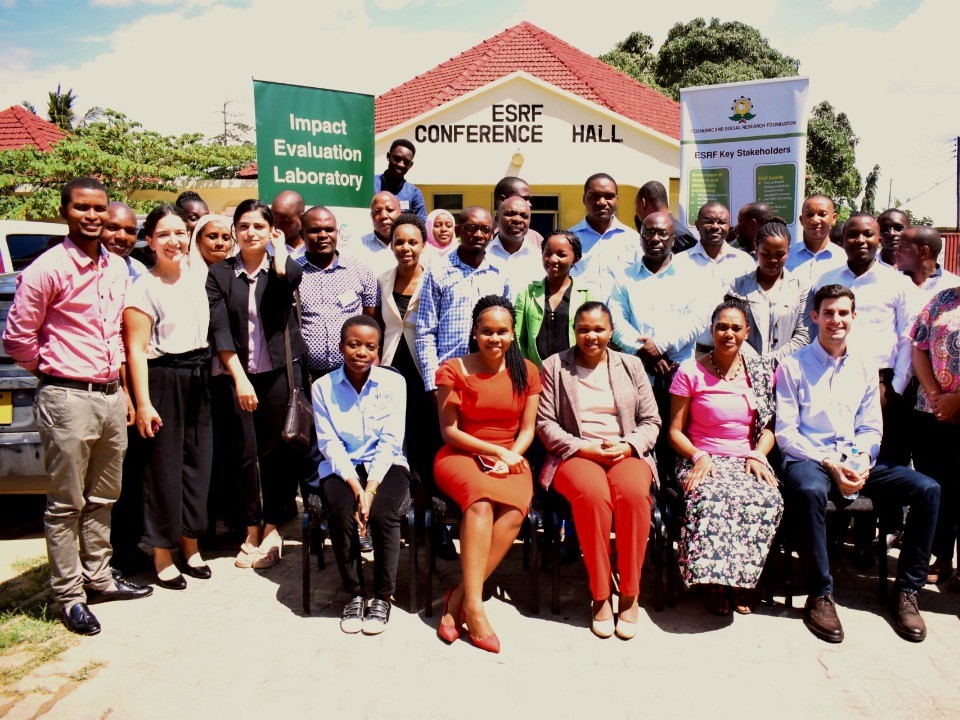
Dr. Constantine Manda, Director of Impact Evaluation Laboratory conducting training workshop on core methods of Impact Evaluation at ESRF Conference Hall, ESRF Conference Hall, September 2019
